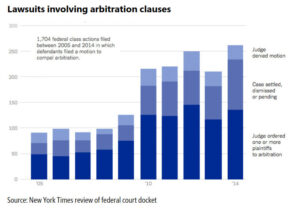
Francisco Pabilla, Jr.
(second from left) with
(from left) PCCI Governor
for Reg. IV, Virgilio Lorenzo;
Antonio Ortega, National
Center for Mediation;
and Clarine Tobias, PCCI
Governor for Reg. V.
PDRC has rolled out its domestic road show beginning with the 25th South Luzon Area Business Conference (SLABC) on March 18 and 19, 2016 in Boac, Marinduque. The confab, with the theme “Small Enterprise…BIG Business,” was the first in a series of area conferences arranged by the Philippine Chamber of Commerce and Industry (PCCI) for the year.
PDRC Assistant Secretary General Francisco D. Pabilla, Jr. spoke on commercial arbitration and PDRC’s role as an arbitration center. Antonio Ortega of the National Center for Mediation talked on mediation.
Dr. Henry Basilio of PCCI made a presentation on logistics and transport infrastructure development, while Andreas Meyn discussed development of competitive human resources. Dr. Hernando Delizo then spoke on wellness tourism, after which Victor Madlangbayan talked on social enterprises.
Marinduque Governor Carmencita O. Reyes attended the conference. PDRC has partnered with PCCI in promoting commercial arbitration among its members.

the u.S. arbitration debate and why it matters to us
PART ONE
In late October 2015, The New York Times published a series of three articles on complaints against big businesses’ use of arbitration to limit consumers’ ability to sue before regular courts. This article summarizes the report. Part 1 discusses the criticisms of arbitration by consumers.
Arbitration is under siege again. For the past several years, there have been several attacks in courts and the U.S. Congress against the Federal Arbitration Act and the arbitration process.
Critics contend that arbitration is unfair and biased, saying that it creates “an alternate system of justice” whose rules tend to favor businesses and deprive millions of Americans a fundamental right—their day in court.
In a three-part series released last year, The New York Times noted how by inserting individual arbitration clauses into consumer and employment contracts, corporations have devised a way to keep people from going to court, prevent class actions, and tilt justice in their favor (“Arbitration Everywhere, Stacking the Deck of Justice,” October 31, 2015, available at http://www.nytimes.com/2015/11/01/business/dealbook/arbitration-everywhere-stacking-the-deck-of-justice.html and two other articles). With so much latitude, some organizations even get to “force” their employees and customers to take their dispute to Christian arbitration, which incorporate prayer into proceedings and where arbitrators can consider biblical scripture in their rulings.
 The Times cited several instances showing how resort to arbitration has increasingly become so pervasive in the U.S. that it has “crept into nearly every corner of Americans’ lives, encompassing moments like having a baby, going to school, getting a job, buying a car, building a house and placing a parent in a nursing home.” These examples showed how arbitration tended to favor businesses and how proceedings could sometimes devolve into “legal free-for-alls.”
The Times cited several instances showing how resort to arbitration has increasingly become so pervasive in the U.S. that it has “crept into nearly every corner of Americans’ lives, encompassing moments like having a baby, going to school, getting a job, buying a car, building a house and placing a parent in a nursing home.” These examples showed how arbitration tended to favor businesses and how proceedings could sometimes devolve into “legal free-for-alls.”
According to the articles, written by banking and consumer finance reporter Jessica Silver-Greenberg and database projects editor Robert Gebeloff, the anecdotes and the records examined from “more than 25,000 arbitration proceedings between 2010 and 2014 and interviews with hundreds of lawyers, arbitrators, plaintiffs and judges in 35 states” showed that arbitration, instead of providing a quicker and more cost-efficient way to resolve disputes promotes injustice instead.
The Times found several occasions where some arbitrators twisted or outright disregarded the law to deliver favorable outcomes to companies, which the arbitrators purportedly consider their clients. It also found some companies— unfettered by strict judicial rules against conflict of interest—steer cases to friendly arbitrators while some arbitrators openly cultivate close ties with companies to get business.
In an interview, Victoria Pynchon, an arbitrator in Los Angeles, says plaintiffs have an inherent disadvantage in arbitration. “Why would an arbitrator cater to a person they will never see again?” she said.
Hans von Spakovsky, senior legal fellow in The Heritage Foundation’s Edwin Meese III Center for Legal and Judicial Studies, noted that despite the long history of arbitration as a successful, less expensive alternative to the cumbersome litigation system, a series of bills have in fact been introduced in the U.S. Congress to eliminate arbitration from certain fields for the protection of consumers. These include:
- • The arbitration fairness act, which would render predispute arbitration agreements unenforceable and invalid in employment, consumer, antitrust, and civil rights disputes and would specify that courts alone, and not arbitrators, could determine the validity and enforceability of an agreement to arbitrate;
- • The arbitration fairness for Students act, which would prohibit colleges and universities that participate in federal student assistance programs from including pre-dispute arbitration agreements in student enrollment contracts;
- • The consumer Mobile fairness act, which would invalidate pre-dispute arbitration clauses in contracts involving consumer mobile services or mobile broadband Internet access service;
- • The fairness in Nursing Home arbitration act, which would invalidate pre-dispute arbitration clauses between long-term care facilities and their residents; and
- • The consumer fairness act, which would amend the Consumer Credit Protection Act to define pre-dispute arbitration clauses in consumer contracts to be an unfair and deceptive trade practice
None of these bills has been enacted into law, says Spakovksy. Nevertheless, the attacks against arbitration, such as the Times reports, continue.
